The world of dog ownership is filled with adventure and fulfillment, especially when you’re given the chance to watch your fur buddy grow. Puppies are fun to play with, and it’s in their growing stages that you need to exert effort in looking after them. There are aspects that your puppy needs to thrive beyond nourishment for its growth, such as proper training.
Puppy training can seem overwhelming, especially since there’s so much for a new puppy to learn. As you train your puppy, remember that you are given the chance to teach him good behaviors before the development of common problems. Before beginning your training, provide your puppy with exercise and interesting toys, as well as treats. Leaving him preoccupied with his own source of entertainment will more likely result in the development of unbecoming behaviors later on, so it’s best to keep him entertained.
There are many other aspects that you need to know about training (read our other training blog post here) your puppy. In this article, we’ve gathered five best dog training tips for you, guaranteed to help you guide your puppy into becoming a healthy and loving member of the family.
1. Reinforcement of Desired Behavior
As you train your puppy, remember to reinforce the behaviors you prefer, along with reinforcing calm behavior. Avoid wrestling with your hands and their mouths, as this encourages puppy biting which can develop into a “mouthy” behavior in your adult dog.
Safely guide your puppy into doing the things you want him to do. Always remember to reward him for good behavior. Soon enough, your puppy will be showing good behavior all on his own!
2. Get your puppy to socialize
Well-socialized puppies usually become healthy adults, so don’t confine your puppy to the four corners of your home, which can create Separation Anxiety and fears. Send him to Doggie Daycare, take him out and experience new places, people, and situations to dispel any behavior concerns, such as excessive barking, aggression, and fear. Moreover, it’s essential that your puppy becomes accustomed to different ways of handling, for example massaging his paws and toes so that he has less fear of nail trims. Introducing him to new people will help immensely, and this can make him feel more comfortable at the groomer and vet.
3. Make house training a priority
As a new puppy owner, housebreaking will be high on the list of priorities. Crate training is the absolute best way to help with housebreaking your pup. It’s frustrating to witness dogs peeing in the house, and a naive puppy is bound to do it all over the place. Begin your potty training by crate training and limiting access to the whole house, open up one room at a time to your pup, and create a potty time schedule, remember to follow it religiously along with frequent potty breaks. Feed him at similar times each day, and after he eats, drinks, or wakes from a nap, take him outside to potty right away.
Your puppy may end up peeing in the house despite your efforts. However, as you clean the mess, remember that punishment will not help with puppy house soiling. Scolding and rubbing a pup’s nose in his mess will only confuse or scare him, ruining the progress of your training altogether. Remember to reward him whenever he relieves himself in designated areas.
4. Deal with bite inhibition early
Another integral part of puppy training is bite inhibition. This particular training involves teaching your puppy how to use his teeth gently. Begin the training by allowing him to use his mouth as you play with him. Should he use his teeth too hard, end the playtime right away. Keep practicing this, and your puppy will eventually learn that playtime stops when he bites too hard, ultimately leading him to use his mouth more gently.
Bite inhibition training is also important because it keeps you and your family members (especially children) safe from needle-like puppy teeth. Moreover, this helps prevent serious incidents of bites in adulthood. Should your puppy ever find the need to use his teeth for defense, bite inhibition training allows him to see the difference between an aggressive bite and a harmless nip.
5. Avert destructive chewing
Puppies usually chew as a way to explore the world around them. Moreover, they enjoy the process of chewing, and in many cases, it helps relieve the pain of growing teeth. With these in mind, never prevent a puppy from chewing but teach him to do so on appropriate chew toys instead. This process is a tricky part of chew training, as it will not be enough to simply tell your puppy “no” when he picks up something he can’t use. If you want to successfully train him, tell him “no” and then redirect him to something he can use, such as dog chews.
Conclusion
It’s undeniable that puppies bring countless benefits to your home. Watching your own grow into a well-adjusted dog can be fulfilling and nurturing. One of the best ways to succeed in doing so is through puppy training, but it takes discipline and so much patience.
We are a Doggie Daycare, Boarding, and Training center in Massachusetts. We’ll pamper your pup with treats, grooming baths, and playtime while you’re away. Get in touch with us today to book a slot!


